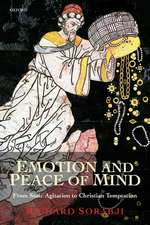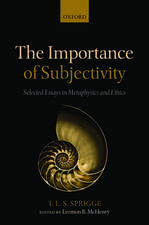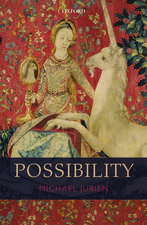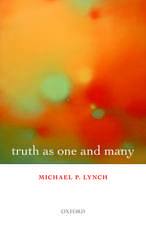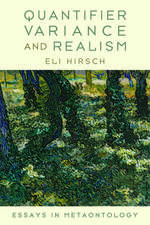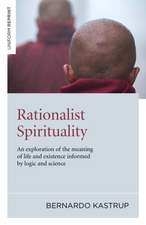Self: Ancient and Modern Insights about Individuality, Life, and Death
Autor Richard Sorabjien Limba Engleză Paperback – 6 noi 2008
| Toate formatele și edițiile | Preț | Express |
|---|---|---|
| Paperback (2) | 263.20 lei 31-38 zile | |
| OUP OXFORD – 6 noi 2008 | 263.20 lei 31-38 zile | |
| University of Chicago Press – 31 oct 2008 | 273.97 lei 6-8 săpt. | |
| Hardback (2) | 186.88 lei 31-38 zile | |
| OUP OXFORD – 14 sep 2006 | 186.88 lei 31-38 zile | |
| University of Chicago Press – 4 feb 2013 | 589.04 lei 6-8 săpt. |
Preț: 263.20 lei
Nou
Puncte Express: 395
Preț estimativ în valută:
50.37€ • 54.74$ • 42.26£
50.37€ • 54.74$ • 42.26£
Carte tipărită la comandă
Livrare economică 14-21 aprilie
Preluare comenzi: 021 569.72.76
Specificații
ISBN-13: 9780199550135
ISBN-10: 0199550131
Pagini: 414
Ilustrații: black & white illustrations
Dimensiuni: 153 x 228 x 23 mm
Greutate: 0.56 kg
Editura: OUP OXFORD
Colecția OUP Oxford
Locul publicării:Oxford, United Kingdom
ISBN-10: 0199550131
Pagini: 414
Ilustrații: black & white illustrations
Dimensiuni: 153 x 228 x 23 mm
Greutate: 0.56 kg
Editura: OUP OXFORD
Colecția OUP Oxford
Locul publicării:Oxford, United Kingdom
Recenzii
So rich and complex a work as this can hardly be expected to elicit the complete agreement of any reader, but I am persuaded that it will prove intellectually fecund for all.
Notă biografică
Richard Sorabji is Fellow and Emeritus Professor of Ancient Philosophy at King's College London and Fellow of Wolfson College, Oxford. Besides co-editing The Ethics of War: Shared Problems in Different Traditions, and editing seventy volumes so far of The Ancient Commentators on Aristotle, he is the author of Aristotle on Memory; Necessity, Cause and Blame; Time, Creation and the Continuum; Matter, Space and Motion; Animal Minds and Human Morals; and Emotion and Peace of Mind.
Cuprins
List of abbreviations
Acknowledgments
Introduction
Part I: Existence of Self and philosophical development of the idea
1 The Self: is there such a thing?
2 The varieties of self and philosophical development of the idea
Part II: Personal identity over time
3 Same person in eternal recurrence, resurrection, and teletransportation
4 Stoic fusion and modern fission: Survival cannot depend on what happens to someone else
5 Memory: Locke’s return to Epicureans and Stoics
Part III: Platonism: impersonal selves, bundles, and differentiation
6 Is the true self individual in the Platonist tradition from Plato to Averroës?
7 Bundles and differentiation of individuals
Part IV: Identity and persona in ethics
8 Individual persona vs. universalizability
9 Plutarch: narrative and a whole life
10 Self as practical reason: Epictetus’ inviolable self and Aristotle’s deliberate choice
Part V: Self-awareness
11 Impossibility of self-knowledge
12 Infallibility of self-knowledge: Cogito and Flying Man
13 Knowing self through others versus direct and invariable self-knowledge
14 Unity of self-awareness
Part VI: Ownerless streams of consciousness rejected
15 Why I am not a stream of consciousness
16 The debate between ancient Buddhism and the Nyaya school
Part VII: Mortality and loss of self
17 How might we survive death?
18 Could we survive through time going in a circle?
19 If we do not survive death, is it irrational to feel dismay?
Table of thinkers
Select bibliography of secondary literature
General index
Index locorum
Acknowledgments
Introduction
Part I: Existence of Self and philosophical development of the idea
1 The Self: is there such a thing?
2 The varieties of self and philosophical development of the idea
Part II: Personal identity over time
3 Same person in eternal recurrence, resurrection, and teletransportation
4 Stoic fusion and modern fission: Survival cannot depend on what happens to someone else
5 Memory: Locke’s return to Epicureans and Stoics
Part III: Platonism: impersonal selves, bundles, and differentiation
6 Is the true self individual in the Platonist tradition from Plato to Averroës?
7 Bundles and differentiation of individuals
Part IV: Identity and persona in ethics
8 Individual persona vs. universalizability
9 Plutarch: narrative and a whole life
10 Self as practical reason: Epictetus’ inviolable self and Aristotle’s deliberate choice
Part V: Self-awareness
11 Impossibility of self-knowledge
12 Infallibility of self-knowledge: Cogito and Flying Man
13 Knowing self through others versus direct and invariable self-knowledge
14 Unity of self-awareness
Part VI: Ownerless streams of consciousness rejected
15 Why I am not a stream of consciousness
16 The debate between ancient Buddhism and the Nyaya school
Part VII: Mortality and loss of self
17 How might we survive death?
18 Could we survive through time going in a circle?
19 If we do not survive death, is it irrational to feel dismay?
Table of thinkers
Select bibliography of secondary literature
General index
Index locorum

